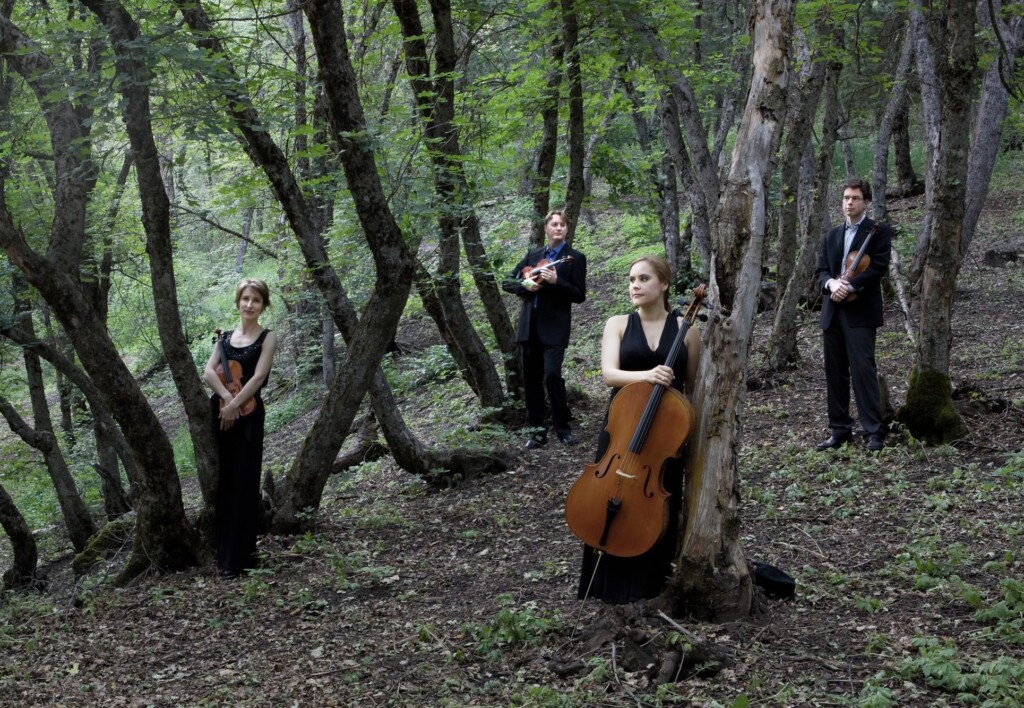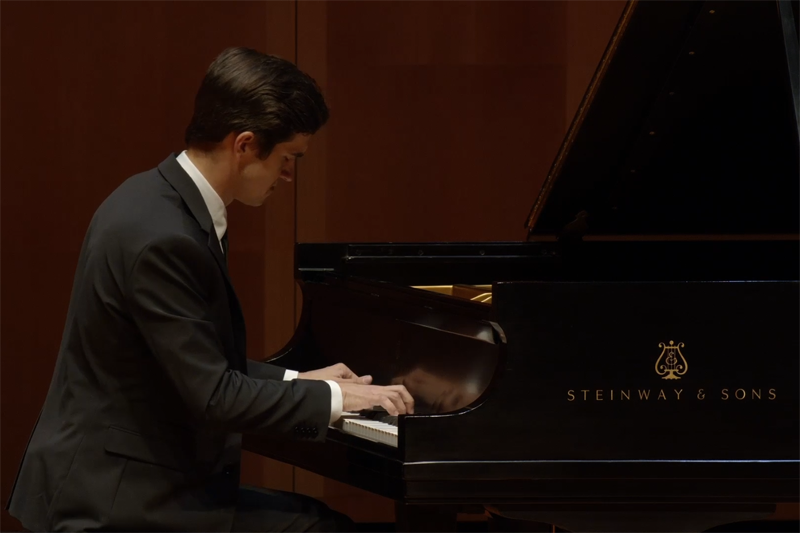It was an easy choice for composer Sarah Kirkland Snider when, in 2015, she was one of nine composers, which the Grand Valley State University’s New Music Ensemble commissioned for their Music In Their Words project. They asked the composers to write music that incorporated the speaking voice of a 20th century composer who had influenced their own work. As a deep admirer of the Estonian composer’s music, Snider had absorbed much of Arvo Pärt’s catalog. She had carefully studied every bar of his 1984 Te Deum. Among her favorite Pärt works were his Tabula Rasa (1977), Berliner Messe (1990) and a string quartet version of Fratres, a 1977 work originally scored for violin, string orchestra and percussion. His organ music, which Snider says takes a different direction, fascinates her equally.
“I first encountered Pärt in the 1990s when I didn’t think of the possibility of becoming a composer. I didn’t consider it a career option living in New York City at the time,” she says in an interview with The Utah Review. “His music was inspiring on a very emotional, and personal level. There is this large cosmic space in the spiritual element of his writing. It is an undeniable religion not in terms of being a religious person but as a sense of it being and feeling truly divine.”
You Are Free, the result of that commission, will receive its Utah premiere at the 45th anniversary season opener for the NOVA Chamber Music Series, on Sept. 18 at 3 p.m. in Libby Gardner Hall at The University of Utah.
The season’s theme is about Connections and the first concert centers on how musical connections arise from inspiration. Snider’s work will be joined by a performance of one of Pärt’s most popular works, Spiegel im Spiegel (1978). The music is versatile — a favorite of ballet and contemporary dance choreographers, documentary filmmakers and in remixes by club DJs. Russian violinist Vladimir Spivakov commissioned Pärt to write a piece for violin and piano, which he premiered in 1978 at the Moscow Conservatory with the pianist Boris Bekhterev.
Meanwhile, Snider’s work, as she describes it in a program note, honors Pärt’s music as “‘both infinite calm and a house on fire,’ which struck me as poignantly apt.” As for the field recording incorporated in the work, she used a video clip from an interview he did with Björk, the quintessentially eclectic pop star. Snider adds, “As I listened to their conversation about the ways in which music affects a listener, I heard a simple F major triad undulating in marimba, piano, and clarinet. From there, I tried to let the piece unfold relatively free of agenda or judgment, something I don’t often do.” The work, which runs a bit longer than six minutes, is scored for flute, clarinet, violin, cello, piano and marimba.
The interview was a serendipitous discovery for Snider. “Somebody had mentioned this crazy interview that Pärt did with Björk and I found it on YouTube. It is an endearing, wonderful conversation where both of them are in a zone on the same wavelength,” she explains. “It has its own sort of charming language and I found different clips of Pärt speaking that would become part of the piece.”
The interview was part of a 1997 BBC documentary about musical minimalists. Pärt’s mantra, as expressed, is, “In art, all things are possible, but not all things are necessary.” As curious as it might sound in pairing Björk with Pärt for an interview, the Icelandic pop star and experimental composer has collaborated with Pärt’s son (Michael), who has worked with major film directors including Francis Ford Coppola, Peter Jackson, and Chatrichalerm Yukol, Prince of Thailand, as well as composer Howard Shore and the Canadian indie rock band Arcade Fire.
Like Pärt, Snider believes that music’s artistic merits should not be prejudiced because they are capable of inducing emotionally powerful responses in the listener. And, as she explains, the music of minimalists such as Pärt and others who have confidently stepped back into the arena of tonality has provided effective opposition to the predominating theoretical discourse in music schools that often has prioritized philosophical abstraction over emotional honesty.
“My piece is a short meditative reflection that can mean whatever it wants for the individual listener,” Snider says. She adds that while the piece can be performed with or without the field recording, many ensembles have chosen to use it. It is akin to the listener’s experience with the soundtrack while watching a film and absorbing all of its multimedia elements.
Snider is a prodigious composer who works in many forms and ensembles and the calendar is packed with performances of her music. Among the projects where she was a collaborator, she composed some of the music for The Measure of All Things, a documentary directed by Sam Green, which premiered at the 2014 Sundance Film Festival. The film included original footage of individuals who are listed in the Guinness World Records book, the subjects of Green’s work.
Also on the concert will be the Utah premiere of a 2020 work, Seen by Nathalie Joachim, which is scored for woodwind quintet. The Imani Winds premiered the work in 2021, which was commissioned by The Phillips Collection. Joachim connects the work to themes of cultural memory in Whitfield Lovell’s Kin Series, in which the artist incorporates found objects of symbolic importance into his conté drawings of ordinary African Americans.
As a program note by Jeff Counts indicates, “‘Much like Lovell’s drawings, the work — a series of five short musical portraits — strives to present each player and object on the basis of their immediacy.’ In the end, both Lovell and Joachim hope to give every viewer and listener ‘an opportunity to make sense of a small piece of a stranger’s past.’”
The concert will conclude with the 1949 piano quintet composed by Russian composer Nikolai Medtner. Joining as pianist will be Cahill Smith, who is a colleague of the Fry Street Quartet members in the Utah State University’s music school. Fry Street Quartet musicians are the series’ current music directors. NOVA subscribers were introduced to some of Medtner’s solo pieces, which Smith performed in a filmed concert that concluded the 2020-21 season.
As The Utah Review noted at the time, Smith has made it his “grand mission” that performances of Medtner’s music are not limited to rare occurrences. In a recorded interview with Fry Street Quartet cellist Anne Francis Bayless, as part of NOVA’s podcast series, Smith said, “I guess the common criticism of Medtner is that his music is old-fashioned. That he was content to stay with the harmonic vocabulary of Brahms, maybe… Brahms plus, I’ll say… All the way until the 1950s. So writing this traditional tonal music in a lot of traditional forms, but trying to say something new with them.”
As Counts’ program note explains, “Medtner spent the last three decades of his life in obscurity and poverty. In addition to Rachmaninoff, contemporary pianists like Cahill Smith should be thanked for what little we do know about Nikolai today. The welcome evangelical efforts of people like Smith bring his forgotten catalogue to life in the 21st century, and they are gaining strength. The Piano Quintet (1949) was a 45-year project for Medtner and his last completed work. It was the noble summation of a promising career, made a bit tragic perhaps by the silence it received (and still receives) in return, but one that also gives weight to the generous pronouncement of his much more famous friend.”
For more information about tickets and the season, see the NOVA Chamber Music Series website.




